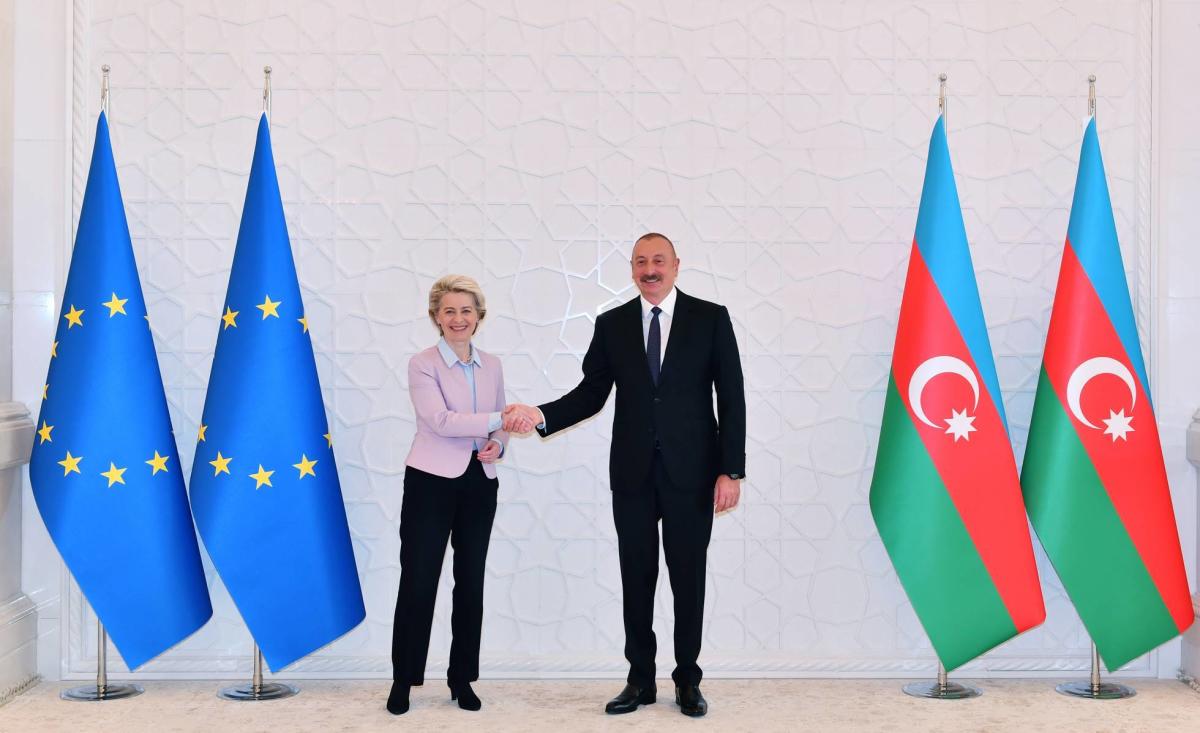Europe is in a rough spot.
For yrs, the European Union (EU) has relied on Russia to supply the oil and gasoline it requirements to energy industries and warmth residences. Past yr, 40% of the gasoline that Europeans burned originated from Russia, and the bloc shelled out $108 billion to the Kremlin.
But Russia’s invasion of Ukraine in February pressured the EU to radically overhaul its vitality approach to wean itself off Russian oil and gas—in a bid to shake off its dependence on the Kremlin, and deprive it of vitality revenues to fund its war. Above the past 6 months, the bloc commenced phasing out Russian oil and gas imports, and sought out other suppliers. In December, the EU will ban imports of Russian crude oil, and by future February, it will ban Russian petroleum solutions (nevertheless pipeline merchandise are excluded from the bans). The EU has also vowed to reduce all Russian gas by the conclude of the decade.
But all of that Russian oil and fuel wants to be changed in get for industries to maintain performing, and people to keep on heating their households.
Together with several other countries, the EU is now hoping that Azerbaijan, a fairly compact nation sandwiched amongst the Caucasus Mountains and the Caspian Sea, will become an crucial alternate to Russian energy. EU Chancellor Ursula Von der Leyen has billed Azerbaijan as a “reliable, trustworthy… [and] critical energy partner” that could double its gasoline exports to the EU in a mere “few years” as Europe tries to quickly diversify absent from Russian electrical power.
But experts say that there are key troubles with betting major on Azerbaijan. The state at this time does not have the offer or ability to fulfill what it reported it could supply. And in an energy to length alone from 1 autocratic regime, Europe is jogging into the arms of another—a method that could backfire supplied the post-Soviet state’s usually shut ties with Russia.
A new chapter for EU energy
In the search for new resources of gasoline, Europe has struck all types of preparations in excess of the previous calendar year with suppliers like Norway and Algeria.
Norway is now the EU’s leading gas provider and has pledged to provide “as a lot gas as possible” to bloc nations its gas exports to the EU are up 8% calendar year-on-year. Meanwhile the EU’s Mediterranean nations around the world have courted Algerian gasoline the North African region is set to improve its fuel exports to Italy for instance, by 20% to 25 bcm this yr.
This July, the EU and Azerbaijan inked a new deal, marking what von der Leyen mentioned at the time was a “new chapter in [the EU’s] energy cooperation with Azerbaijan—a essential lover in our efforts to shift away from Russian fossil fuels.”
Brussels is billing the deal as a single that will “contribute substantially to Europe’s protection of offer,” according to the EU chancellor. The memorandum of knowing (MoU) pledges to double Azeri gas exports to at minimum 20 bcm by 2027—which would equate to about 6% of the EU’s gas demand—but authorities have forged doubt on no matter whether Azerbaijan can even produce on this promise.
While its contributions are reasonably little, recruiting Azerbaijan as a vital power lover is eye-catching to the EU for its perceived security and the probable scalability of Azeri fuel projects and pipelines.
Azerbaijan—a country that borders Iran, Turkey, Ga and Russia—routes its gasoline to Europe through the Trans-Adriatic Pipeline (Faucet), the ultimate leg of the 3,500-kilometre Southern Gasoline Corridor (SGC) pipeline community, which was introduced in 2013 and began working in late 2020.
The country’s oil and fuel manufacturing is jointly operated by its point out oil company SOCAR and foreign partners, BP currently being the most noteworthy. The government is one of a kind in that it hasn’t sought to revise the terms of its output sharing agreement with global firms, generating it a “pretty reliable” energy companion for the EU, John Roberts, a non-resident senior fellow at the Atlantic Council’s World-wide Power Sector and a member of the United Nations’ Financial Commission for Europe’s Group of Specialists on Gasoline, explained to Fortune. “Its technique has… been that when situations are good, toughen up the phrases for the future generation sharing arrangement. [But] when they are really hard, ease them,” he said.
Gasoline flows from Azerbaijan to the EU have surged in the final 8 months. By the conclude of this 12 months, the bloc is expected to import 11.6 bcm of Azeri gas—a 40% development from 8.2 bcm final 12 months. And Azerbaijan’s Tap is meant to be scalable, indicating it can double its gas transit potential to the 20 bcm outlined in the deal, Tom Purdie, senior gasoline analyst and EMEA fuel analytics at commodity expert services business S&P World-wide Commodity Insights, explained to Fortune. Azerbaijan’s gasoline volumes are not more than enough to substitute Russia’s alone—which overall 150 bcm annually—but perform alongside one another with other actions to take away Russian electrical power from the EU’s vitality blend, he observed.
And some optimists believe that the offer could be bigger than just purely natural fuel. Nearer cooperation involving Brussels and Baku could support transform the put up-Soviet point out into a “key European partner,” going it outside of Russia’s sphere of affect, Ilayda Nijhar, a political chance analyst centered on Russia and former Soviet states, wrote for world-wide affairs imagine tank ODI in August. As Russia grows much more isolated, Azerbaijan has turn into additional important to the Kremlin as a trade connection to Iran and Asia.
Imperfect partner
Even now, Azerbaijan is much from the dependable spouse that von der Leyen is promoting—nor does it have the essential gas, infrastructure or money to grow its infrastructure to produce on its offer with the EU, some authorities say.
The EU’s offer with Azerbaijan basically gives “zero relief” to EU citizens “this winter or the next… and almost certainly not the one particular soon after that either, ” Bowden claimed. It typically serves as a go to clearly show EU citizens that policymakers are “doing one thing,” he stated.
He clarifies that Tap gasoline arrives from two tasks at Shah Deniz—Azerbaijan’s largest normal gasoline area operators are now ramping up output to its maximum output.
Meanwhile the country’s two most important probable sources—a 3rd advancement at Shah Deniz and one more at the Azeri Chiraq Guneshli gas field—are “technically complex… and when any agreements are reached, will consider several yrs to convey online,” in accordance to Roberts. At the exact same time, Azerbaijan’s domestic gas use is growing. French energy giant Whole is preparing a new task that will produce 1.5 bcm of gas—but that is earmarked for domestic use.
“There is no rapid prospect of massive-scale fuel developments… between now and 2027,” Bowden reported. Any main gas project—if it happens—won’t happen ahead of 2030, which would make it difficult for the EU and Azerbaijan to fulfill the conditions outlined in their July deal, he stated.
Azerbaijan also lacks the cash to ramp up generation and infrastructure and must “invest heavily” to offer additional fuel to Europe, Gubad Ibadoghlu, a senior visiting fellow at the London University of Economics (LSE) and senior analyst for social and financial scientific tests at Azerbaijan’s Economic Analysis Heart, informed Fortune. And the higher price of providing Azeri gasoline to Europe beforehand inhibited gasoline flows to the continent.
Azerbaijan could, in concept, buy fuel from countries like Turkmenistan, Iran and Russia to fulfill its domestic requirements, and in transform provide its own gas to Europe. But it would continue to need to enhance and broaden its infrastructure, additionally sanctions make it “impossible” to purchase from Russia, he mentioned.
Trading just one strongman for an additional
Aside from arguments about irrespective of whether or not the Azerbaijan deal is even possible, critics argue that in an exertion to distance itself from Putin’s Russia, Europe has merely traded one particular authoritarian for another.
The EU’s new energy offer shows that it is even more “entrenching itself with [Azerbaijan’s] despot regime” and continuing to dismiss the human legal rights abuses and corruption having area beneath Azerbaijani President Ilham Aliyev’s routine, Gligor Radečić, a fuel campaigner at CEE Bankwatch, a network of environmental-centered non-governmental companies, told Fortune.
Aliyev, who has dominated the Caspian state for 19 years, proceeds to wage a “vicious crackdown on critics and dissenting voices. Unbiased activism, significant journalism and opposition political action has been pretty much extinguished,” according to advocacy group Human Rights Enjoy (HRW). Just in September, Armenia accused Azerbaijan of attacking its territory—the new conflict killed virtually 300 soldiers—a declare that Aliyev’s federal government refuted, but just one that the U.S. condemned as “illegal and lethal.”
That dictatorship could also be lousy for organization. Azerbaijan makes a “poor partner” for the EU in phrases of excellent and stability, Ibadoghlu claimed. “In Azerbaijan, the ruling household tends to make its very own choices. They can back again off or postpone [cooperation] at any time because of to Russia’s impact,” potentially leaving the EU in a bind, he said.
Philippe Dam, HRW’s Europe and Central Asia director, warns that Europe has missed a major possibility to position human legal rights at the best of its agenda with its partnership with Azerbaijan. The EU-Azerbaijan offer positive aspects the govt, nevertheless does not “guarantee… any human legal rights safety,” Dam informed Fortune.
“A nation cracking down on its possess people… is not sufficiently responsible to engage with the EU,” he said.
The EU has been left with handful of superior alternatives. While the EU’s gas storage internet sites are now 95% comprehensive, the bloc could nonetheless confront a shortfall of as significantly as 30 bcm of gasoline following summer months, underlining the urgent will need to tap alternate suppliers—or considerably reduce fuel usage, in accordance to new assessment from the Global Strength Agency. The bloc’s best bets for fuel suppliers are Russia, Azerbaijan, Algeria and Norway—and with the exception of the latter, all are authoritarian states that will use gas exports as a political weapon, Radečić explained.
But the bloc’s diversification technique as a whole—which contains sourcing from the international liquified purely natural gasoline (LNG) market—could “replace Russian gasoline volumes if all goes well,” Bowden explained. Azerbaijan is not a “one-quit solution” for the EU, but one husband or wife amongst many, he observed.
Now, it’s up to investors and banks to step up to finance pipeline expansions and exploration of new gasoline fields in Azerbaijan. As Ibadoghlu place it: “If they do not, Azerbaijan will are unsuccessful to access its goal of getting a trustworthy gas provider to Europe by 2027.”
This tale was initially featured on Fortune.com
More from Fortune:
The American middle class is at the stop of an era
Elon Musk is experiencing demo once again over his $56 billion Tesla paycheck that’s ‘the largest in human history’
The winners of the $1.5 billion Powerball jackpot will almost certainly just take it in money. That is a large mistake, gurus say
The US may be headed for a ‘tripledemic’—one physician difficulties an urgent warning






